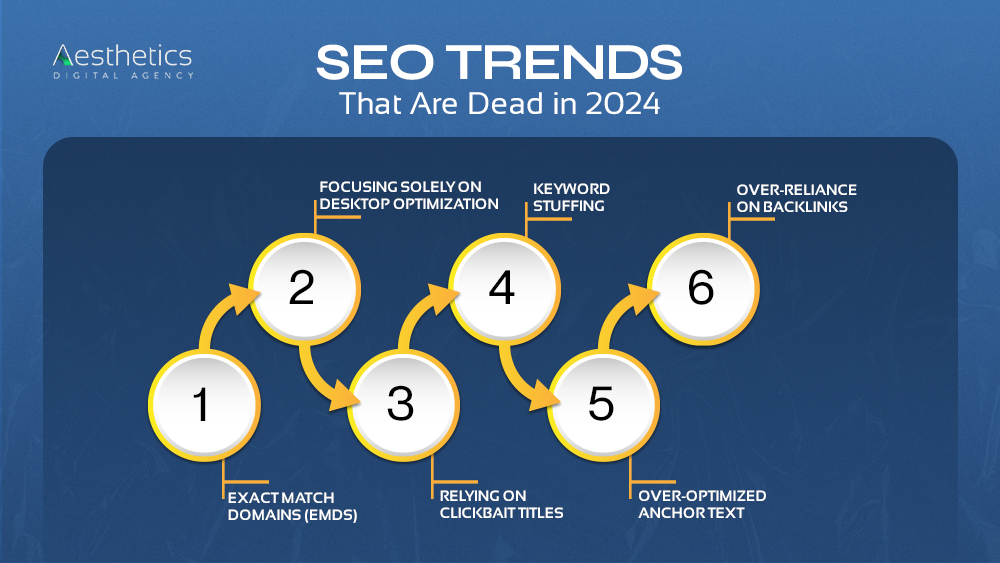In digital marketing, SEO trends change quickly. What worked last year, or even a few months ago, might no longer be effective today. As we head into 2024, certain SEO practices that once brought results are now outdated, ineffective, or even harmful to your site’s ranking.
Since 2024, Google has upscaled its SEO policies and criteria normally known as EEAT to cater to all websites with much keen comparison and shedding of AI-driven content. With Google upscaling its policies and introducing stricter criteria for SEO, it’s time to let go of no longer relevant trends.
In November 2023, Google initiated substantial changes to its search engine algorithms. Sites were forced to consider how best to optimize to maintain their rankings on the world’s leading search engine’s results pages.
Here are some of the SEO trends that are officially dead in 2024

1. Keyword Stuffing
Keyword stuffing is the overuse of a specific keyword within a webpage’s content in an attempt to manipulate search rankings. It’s a strategy where keywords are unnaturally repeated, often at the expense of readability and user experience. The search engine would use algorithms to identify the keywords and how frequently they are used.
Google views keyword stuffing as a spam technique and has categorized it as a violation of its spam policies, which can result in penalties or lower rankings. Google now penalizes the content that messes with its rankings. The priority has always been to provide quality content to the users.
When a website is penalized for keyword stuffing, it will no longer appear on the first page of search engine results, making it much harder for users to find it. Therefore, it is important to run a competitive analysis of keywords in order to gain search engine rankings.
2. Focusing Solely on Desktop Optimization
Mobile-first indexing is nothing new, but in 2024 it’s a priority. With the majority of searches now taking place on mobile devices, Google primarily uses the mobile version of your site for ranking purposes.
On July 5, 2024, Google announced completing its mobile-first indexing initiative, with Mueller saying Google will not index or rank websites not accessible on mobile devices after that date. This indicated that a site that looks great on the desktop but fails to provide user experience on mobile would struggle to perform in terms of ranking.
The successful strategy of SEO implies that it has important components such as speed, user experience (UX), and mobile-friendly design which can help secure higher rankings and ensure that the visitors stay at your site for longer periods.
3. Overreliance on Backlinks
While backlinks remain one of the most important factors in ranking your content, the way they are used has changed in 2024. In the past, using a large quantity of backlinks would help boost the content. Now Google emphasizes the fact that excessive backlinks shouldn’t be used and the quality and relevance should be maintained.
The most important thing is to build connections through credible sources. If the backlinks prove to be relevant to your content and industry, they are still valuable but the trick is to avoid using a lot of links as Google will penalize you on that.
4. Relying on Clickbait Titles
A clickbait headline is like empty calories for your curiosity, tempting at first, but ultimately unsatisfying. This kind of content title depends on shock or surprise to draw readers in, often masking a low-quality story underneath. It typically uses casual language, incorporating slang or abbreviations to create a sense of urgency or excitement. But the important thing to understand is that it no longer works to rank your content.
Titles like “You Won’t Believe What Happens Next” or “The Secret to Instant Success” may still generate a few clicks, but Google’s algorithms have become smart enough to identify when the content doesn’t match the promise of the headline.
5. Exact Match Domains (EMDs)
For years, the belief was that having a keyword-rich domain would almost guarantee high rankings. While this strategy worked in the past, the shift in SEO dynamics has made this trend outdated. In 2024, simply having an exact match domain (e.g., “bestdogtoys.com” for a business selling dog toys) won’t help you rank higher.
Google now prioritizes content quality, user experience, and domain authority over domain name alone. So, instead of focusing on stuffing keywords into your domain name, it’s better to focus on building a strong brand, creating valuable content, and delivering an excellent user experience.
6. Over-Optimized Anchor Text
Anchor texts are a key factor in SEO and can boost your search engine rankings when used effectively. However, if overused or manipulated, over-optimized anchor text can have the opposite effect, potentially harming content rankings. In 2024, it’s important to use natural, contextually relevant anchor text. It is important to let the text naturally flow rather than forcing the keywords.
Conclusion
SEO is becoming more practical as we move into the year 2024. The rules that were applied and were relevant even a year ago are not effective today. From keyword stuffing to clickbait titles and over-optimized anchor text, these trends are dead and gone.
The key components are quality content, mobile optimization, voice search, and following Google’s EEAT guidelines, which can help you stay ahead and ensure your website remains relevant in an increasingly competitive content market.
As SEO trends evolve, one constant remains: the need to provide value. By keeping your content fresh, genuine, and user-focused, your site will rank well and also earn the trust and loyalty of your audience.







